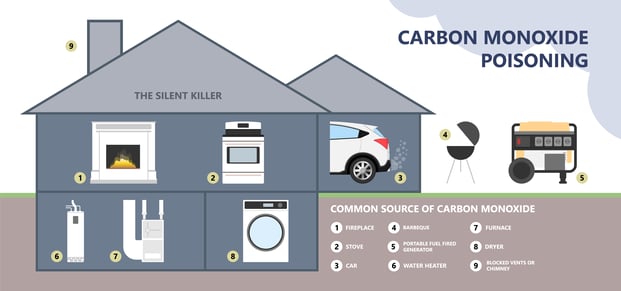
Shelter is one of the three requirements for survival. Our homes are meant to be our sanctuary and provide us with comfort and protection from the environmental elements. However, there are many ways in which our homes can actually be detrimental to our health and safety. Walking Mountains Science Center in partnership with Energy Smart Colorado conducts home energy assessments in our local area. Our certified building analysts are trained to identify safety issues during home energy assessments. From 1/1/2018 through 3/31/2021 (just over 3 years) a total of 475 HEAs were performed on natural gas and propane heated households. Safety issues were identified in 22% of these homes. Approximately 81% of safety issues found in gas heated homes are related to gas leaks and high carbon monoxide (CO) levels.
Table 1. A break-down of the types of safety issues found in gas heated homes from 2018 through Q1 2021.
|
Safety Issue |
2018 |
2019 |
2020 |
Q1 2021 |
2018 – Q1 2021 |
% of All Safety Issues** |
|
Gas Leak |
8 |
19 |
17 |
4 |
48 |
45% |
|
High CO Levels |
12 |
5 |
13 |
1 |
31 |
29% |
|
Gas Leak & High CO Levels |
- |
1 |
6 |
- |
7 |
7% |
|
Appliance Intake Air |
- |
- |
3 |
- |
3 |
3% |
|
Safety Recall |
3 |
- |
- |
- |
3 |
3% |
|
Furnace Service |
- |
1 |
- |
- |
1 |
1% |
|
Ventilation |
- |
1 |
1 |
- |
2 |
2% |
|
Other* |
8 |
- |
2 |
2 |
12 |
11% |
|
Total Safety Issues |
31 |
27 |
42 |
7 |
107 |
|
|
Total w/ Gas Heating |
160 |
171 |
109 |
35 |
475 |
|
|
Safety Issue Percent |
19% |
16% |
39% |
20% |
22% |
|
|
*The issues found in the “Other” category include: standing water, organic matter, water heater issues, missing CO detector, electrical, clothes dryer issues, improperly abandoned gas line, gas manifold test gauges left on. **Sum of percentages may not add to 100% due to rounding. |
||||||
Gas leaks and high CO levels can have catastrophic consequences. Natural gas is highly combustible and leaks within your home can result in explosion. Carbon monoxide has the ability to kill occupants if it is not detected soon enough. It is produced by combustion appliances and can build up in the home if those appliances are not running efficiently or vented properly. A home energy assessment includes gas leak detection and combustion appliance zone testing.
Ideally, our houses would protect us from the elements and provide us with fresh air at a safe and healthy air exchange rate. The air exchange rate is the pace at which fresh air replaces the stale, polluted air within a home. Do you know how often the air in your home is refreshed? Our home energy assessments include a blower door test which determines home air leakage rate under pressure and calculates the natural air changes per hour. The ability to control the air quality and exchange rate can be accomplished through use of a mechanical ventilation system. Mechanical ventilation can be anything from a robust energy/heat recovery ventilator or kitchen hood/bathroom fan that vents to the outside.
We encourage you to contact an energy coach at Walking Mountain Sustainability to schedule a home energy assessment or learn more about health and safety in your home. Our certified BPI Building Analysts can identify hidden safety issues in your home. They can also provide you with your home’s air leakage rate and natural air changes per hour. We are available to help interpret the results of your home energy assessment and connect you with the work force needed to address any issues.
William Schmick was a 2020 Sustainability Intern with Walking Mountains Science Center.







